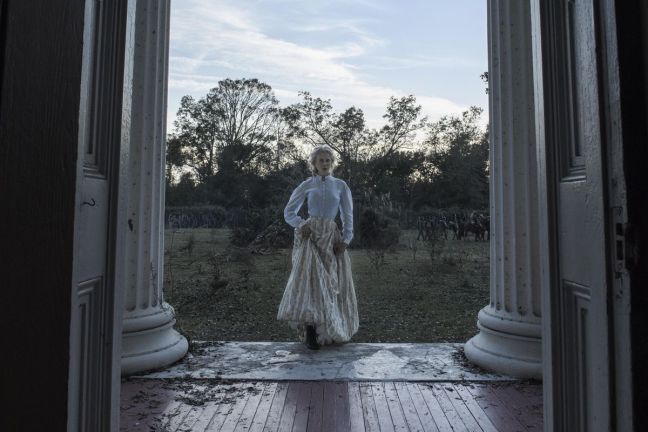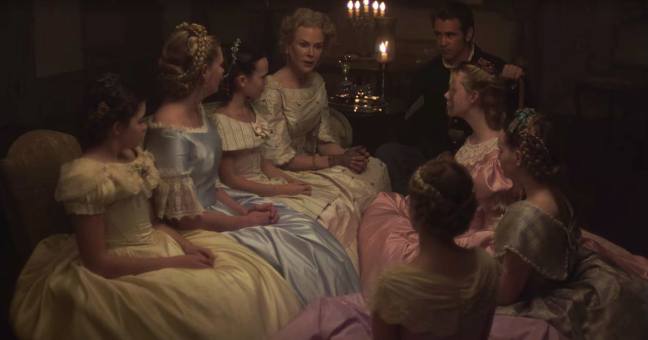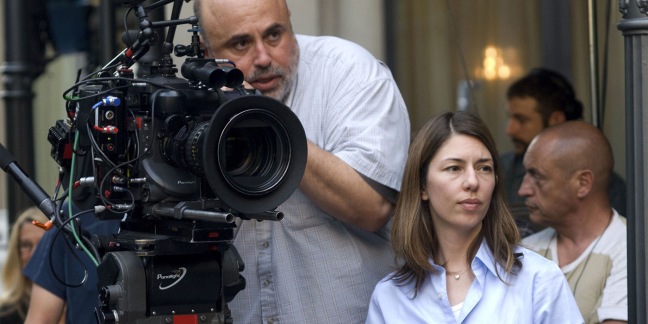
Sensuality without love is a sin; love without sensuality is worse than a sin. / Jose Bergamin
The oppressive sound of late afternoon cicadas blanket the emerald hued deep south woods whose very branches seem to hang down in some sort of defeat from the summer sun. A young girl steps into the space, humming a tune while picking mushrooms from the mossy floor. She takes her time stepping amidst the wooded area and comes upon unexpectedly to find a wounded Union soldier lying against a tree.
This is how writer and director Sofia Coppola’s newly realized take on The Beguiled begins. Filmed previously by the underappreciated Don Siegel in 1971 with Clint Eastwood and Geraldine Page, Coppola ramps up the mood with dripping humidity and creeping sensuality that seems to emanate from the surrounding trees right from the very first frame. Setting the mood a couple of years into the American Civil War, an all girl’s school in Virginia finds themselves sheltered and cut off from society with only the distant sounds of cannon fire to remind them of the encroaching brutal war surrounding them. Daily lessons, gardening, and evening prayers take up the bulk of their lives. Routine for survival during wartime which brings the household into a protective bubble that is in danger of bursting with the appearance of the wounded Corporal McBurney (Colin Farrell). Head mistress, Miss Martha (played with the usual aplomb by Nicole Kidman) eyes the intrusion with suspicion and an undercurrent of buried sexual desire despite her lofty station within the school.

The rest of the cast includes Kirsten Dunst (a regular of Coppola’s films) as the repressed, but yearning Edwina and Elle Fanning as Alicia, the budding young woman barely containing her sexuality (notice how her blouse is rebelliously unbuttoned halfway in the beginning sequence). The rest of the young actors Oona Laurence, Angourie Rice, Addison Riecke, and Emma Howard are first rate unknown faces which lend an authenticity to the period. In all of Coppola’s films, the exploration of female sexuality and gender are forefront in her vision. The Beguiled affords a chance for Coppola to zero in on these specific themes with a dark foreboding melancholy of hidden desires. Her insistence on focusing the camera longingly on the beautiful forms of costumes, surrounding nature, architecture, and the human body is unmistakably Coppola’s eye (look no further than her excellent Lost In Translation). For some, this may be a slow, but slowly burning, film that takes too long to reach its pivotal climax of gender wars. It seems to be Coppola’s intention for this pace to build up the tension slowly so that the audience has the time to appreciate each of the character’s eccentricities, hopes, and somewhat fatal desires that Corporal McBurney unlocks. Madness does not arrive in quick editing jump cuts or swirling camera moves. This madness comes out of necessity and slowly evolving logic. There seems to be no alternative when faced with the Corporal’s rage and hostility towards the women.
There is one presence that seems to be missing in Coppola’s “gender Civil War” period drama; the African-American presence. This is a Civil War drama located in the South that has no appearance of slaves, working or freed. The school has none, perhaps as a result of runaways or some other event. It is never mentioned (to my knowledge) in the film, although the original source novel does contain characters as such. Does the exclusion of such characters do a disservice to the story? Or does it focus ever so much more on the subject at hand; gender and sexuality? All through Coppola’s work, the same themes are of interest to her and The Beguiled is no different. By excluding the presence of African-Americans in this Civil War themed drama, Coppola is only using the artist’s intent to tell the story on her terms because this is what interests her the most. If she were to introduce a racial theme in the midst of already established points, the story would lose its concentrated focus. Perhaps there is another story to be told that would not only present gender differences, but racial differences within the same gender. The Beguiled is not that story and therefore confidently renders its intended vision.
The Beguiled is a rich and darkly atmospheric tale which goes beyond conventional stories pervading today’s mulitplex cinemas. It requires your patience and richly rewards it with questions of morality and female empowerment. Coppola’s film does not purport to have any answers, but it does make you think of the differences of perception between men and women; the persona (or mask) we tend to wear that is wrenched away when threatened or emboldened with desire. As Miss Martha quietly tells her girls, “…it’s seems the enemy… it’s not what we believed.” The enemy being their most unwelcome guest and all he symbolizes.

[Writer/Director Sofia Coppola on set, 2016]
